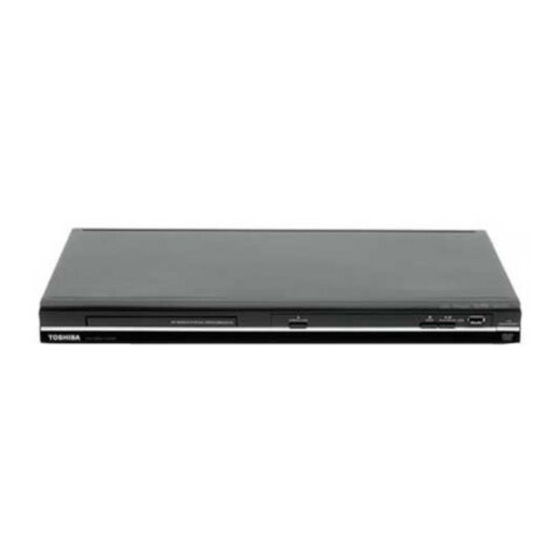Toshiba SD291EKE Manual do Proprietário - Página 21
Procurar online ou descarregar pdf Manual do Proprietário para Leitor de DVD Toshiba SD291EKE. Toshiba SD291EKE 28 páginas. Dvd player
Também para Toshiba SD291EKE: Manual do Proprietário (28 páginas)

View Mode
Use view mode to scale an image that fits to the TV
screen's width and height.
In ' Video ', press / to select { View Mode },
A
then press .
{ Fill }
Fill the screen with decoded image.
{ Original }
Display image as its original size.
{ Height Fit }
Fit the screen height with image height.
{ Width Fit }
Fit the screen width with image width.
{ Auto Fit }
Automatically display the decoded image on screen
at a suitable size.
{ Pan Scan }
Automatically display decoded image on full screen
without distortion.
Use / to select a setting and press OK to
B
confirm.
Tip:
-Depending on the type of disc, you may not be able
to view the mode as selected.
TV System
The video standard of the DVD player output can be
selected from "NTSC", "PAL" or "Multi".
{ NTSC }: Select if your TV system is NTSC.
{ PAL }: Select if your TV system is PAL.
{ Multi }: The DVD video player automatically
identifies PAL or NTSC video system of a disc.
Connect a multisystem TV (PAL/NTSC compatible) to
view a picture.
A playback picture may be distorted when detected a
signal change between PAL and NTSC on the disc.
For the case of Progressive mode, your multisystem
TV must be able to support 525p and 625p.
With the disc tray opened, you can also press
number button "3" to switch between "NTSC" and
"PAL".
Video Out
The video output of the DVD player can be selected
as "Component", "RGB" or "P-Scan".
In ' Video ', press / to select { Video Out },
A
then press .
{ Component }
Select this for composite video or component video
connection.
{ RGB }
Select this for Scart connection.
{ P-Scan }
Select this when you connect your DVD player to
your TV, which has component video inputs that
supports progressive scan.
Use / to select a setting and press OK to con-
B
firm.
If the progressive scan feature is activated but
the connected TV does not support progressive
scan, press number button "1" with the disc tray
opened to set the video output of the DVD player to
"Component".
Helpful hint: Press to go back to previous menu item.
Press SETUP to exit the menu item.
DVD Menu Options
Smart Picture
This DVD player provides four predefined sets of
picture color settings.
In ' Video ', press / to select {Smart Picture },
A
then press .
{ Standard }
Select this for a preset standard picture setting.
{ Vivid }
Select this to make the picture brighter.
{ Cool }
Select this to make the picture softer.
{ Personal }
Select this to personalize your picture color by
adjusting the brightness, contrast, tint and color
(saturation).
Use / to select a setting and press OK to
B
confirm.
If you select { Personal }, then proceed to steps
C
D~G.
The setup menu appears.
0
Brightness
0
Contrast
0
Tint
0
Color
Close
Press / to highlight one of the following options.
D
Brightness
Increase the value to brighten the picture or vice
versa. Choose zero (0) for average setting.
Contrast
Increase the value to sharpen the picture or vice
versa. Choose zero (0) to balance the contrast.
Tint
Increase the value to darken the picture or vice
versa. Choose zero (0) for average setting.
Color
Increase the value to enhance the colour in your
picture or vice versa. Choose zero (0) to balance the
colour.
Press / to adjust the setting that best suits
E
your personal preference.
Repeat steps D~
to adjust your picture
F
E
preference.
Press / to select 'Close' and press OK to
G
confirm.
JPEG Interval
You can continuously playback all JPEG files
automatically. Set "JPEG Interval" to "5 Seconds",
"10 Seconds" or "15 Seconds".
In ' Video ', press / to select { JPEG Interval },
A
then press .
{ Off }
Plays back one file at a time.
{ 5 Seconds }
Plays back images in the form of a slide show at 5
seconds intervals.
{ 10 Seconds }
Plays back images in the form of a slide show at 10
seconds intervals
{ 15 Seconds }
0
